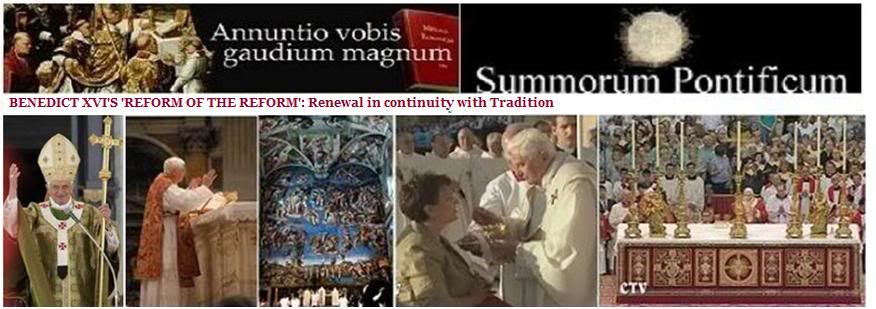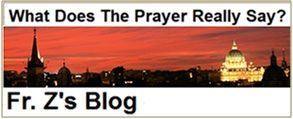 The Vatican is preparing a manual
The Vatican is preparing a manual
to help priests say Mass properly
by H. Sergio Mora

ROME, January 16, 2013 (Zenit.org) - The Congregation for Divine Worship and the Sacraments is preparing a booklet to help priests celebrate the Mass properly and the faithful to participate better, according to the prefect of the Congregation for Divine Worship and the Sacraments.
Cardinal Antonio Cañizares confirmed this Tuesday at an address at the Spanish Embassy to the Holy See on "Catholic Liturgy since Vatican II: Continuity and Evolution."
"We are preparing it; it will help to celebrate well and to participate well. I hope it will come out this year, in the summer," the cardinal told ZENIT.
During his talk the cardinal reiterated the importance Vatican II gave to the liturgy, "whose renewal must be understood in continuity with the Tradition of the Church and not as a break or discontinuity." A break either because of innovations that do not respect continuity or because of an immobility that freezes everything at the time of Pius XII, he said.
In particular, Cardinal Cañizares stressed the importance that
Sacrosanctum Concilium gave to liturgy, through which "the work of our Redemption is exercised, above all in the divine sacrifice of the Eucharist," adding that "
God wants to be adored in a concrete way and it's not up to us to change it."
[A statement like that - 'God wants to be adored' - makes me queasy! Did God ever ask man explicitly to adore him? Of course, it is implicit in the First Commandment: "...Thou shall not have strange gods before me" (i.e., 'other than me'). But the Lord's Prayer does not order it. I looked up a Catholic online guide which says Jesus summed up man's duty to God, thus: as "You shall love the Lord your God with all your heart, and with all your soul, and with all your mind." (Mt 22:37);(Luke adds "...and with all your strength.") IMHO, man's adoration of God is the natural consequence - one that does not have to be ordered - of believing in him as 'the Father almighty, Creator of Heaven and earth', and being so, he deserves the best that man can offer, in thought, word and deed, including the act of worship, liturgy.]
The cardinal said that there is talk of a renewed Church, which must not be understood as a mere reform of structures, but as a change starting with the liturgy, because it is from the liturgy that the work of our salvation is effected.
When speaking of the liturgy, continued the cardinal, one must not forget that the conciliar document states: "Christ is always present in his Church, especially in the liturgical action. He is present in the sacrifice of the Mass, be it in the person of the minister, 'offering himself now through the ministry of the priests as he then offered himself on the cross,' be it especially under the Eucharistic species."
He stressed that the objective of the liturgy "is the adoration of God and the salvation of men," and that the liturgy is not a creation of ours.
[Not having seen the cardinal's text, I don't know exactly what he said. But, yes, liturgy is human creation, except that, until Vatican=II, it was derived and grew organically from the worship traditions of the Church, and was not imposed overnight on the universal Church as a readymade formula that took just several months to devise! Nonetheless, the Novus Ordo is historical reality, so, imperfect and flawed as it is, we must do the best we can with it, as Benedict XVI constantly demonstrates.]
The prefect of the Congregation for Divine Worship and the Sacraments criticized existing abuses such as showmanship, and praised moments of silence "that are action," which enable the priest and the faithful to talk with Jesus Christ and which exclude the predominance of words that often becomes showmanship on the part of the priest. The correct attitude is the one "indicated by Saint John the Baptist, when he says he must decrease and the Messiah must increase."
The cardinal criticized efforts to make the Mass "entertaining" with song and dance, instead of focusing on the mystery of the Eucharist, and said these were attempts to overcome "boredom" by transforming the Mass into a show.
He added that the Council did not decree that the priest must celebrate Mass facing the people, but that
Sacrosanctum concilium stressed the importance of Christ on the altar.
Asked by the ambassador of Panama to the Holy See about the action of native cultures in the liturgy, the cardinal specified that "the Council speaks of inculturation of the liturgy," respecting "the legitimate varieties" without affecting the principles.
He recalled his experience on Palm Sunday in Santa Fe, Spain, when he attended a gypsy Mass in which a youth sang the Agnus Dei with an instrument used in flamenco singing - he called it "a real groan from the soul," which "moved everyone and brought the whole assembly to participate."
He also referred to the fact that in many churches the Most Blessed Sacrament is placed in a side altar or chapel, so that "the tabernacle disappears."
[Can you imagine a Jewish synagogue putting its Holy of Holies off to one side that people have to look for it? But progressivist Catholic priests and bishops think so little of the tabernacle and what it means that it was one of the first things they got rid of, along with the main altar and communion rails!]
Regarding the case of the late Archbishop Marcel Lefebvre, who founded the traditionalist Society of St. Pius X, the cardinal said that Benedict XVI offered them a healing measure, but his followers have turned him down. "To think that Tradition stops with Pious XII is also a break in the tradition of the Church," he noted.
This item reminds me that I failed completely to post or even note a most interesting development observed by the followers of Father Z's blog, at the most recent Christmas Eve Mass celebrated by Benedict XVI, though I had flagged the item for posting. I was hitting myself on the head even, because I watched that Mass twice and never paid attention when Communion was being given to the general public. Mea culpa, and better late than never for the following - it is also very apropos to the above news item:
Papal midnight Mass with
no communion in the hand

December 24, 2012
...Among them was this email from a priest in Rome:
In a change from former practice, those distributing Holy Communion at the Holy Father’s Mass tonight were told that "at all Papal Masses, Communion is to be given only on the tongue." The usual statement that Prelates receive in the same way as the Laity remained...
One e-mail was from a layman who watched the Mass:
Did you notice that during the communion of the faithful during Pope Benedict’s Midnight Mass at least one priest refused to give Holy Communion on the hand? Instead, the security guard near this priest motioned for each communicant to receive on the tongue. If the communicants didn’t get the hint, the priest still did not give them the Host in the hand, but rather held It near their mouth until they finally understood. Some of the people looked very surprised when they held their hands out and didn’t get the Host.
Well, after eight years of setting the example very conspicuously and most people still don't get it, even if they are attending Mass at St. Peter's, it's obviously time to spell it out. I wonder what Cardinal Canizares's booklet will say about this... Frankly, I never could figure out why on earth anyone ever thought of such an awkward, time-wasting and ultimately meaningless gesture as 'communion in the hand'.
[Modificato da TERESA BENEDETTA 19/01/2013 21:13]